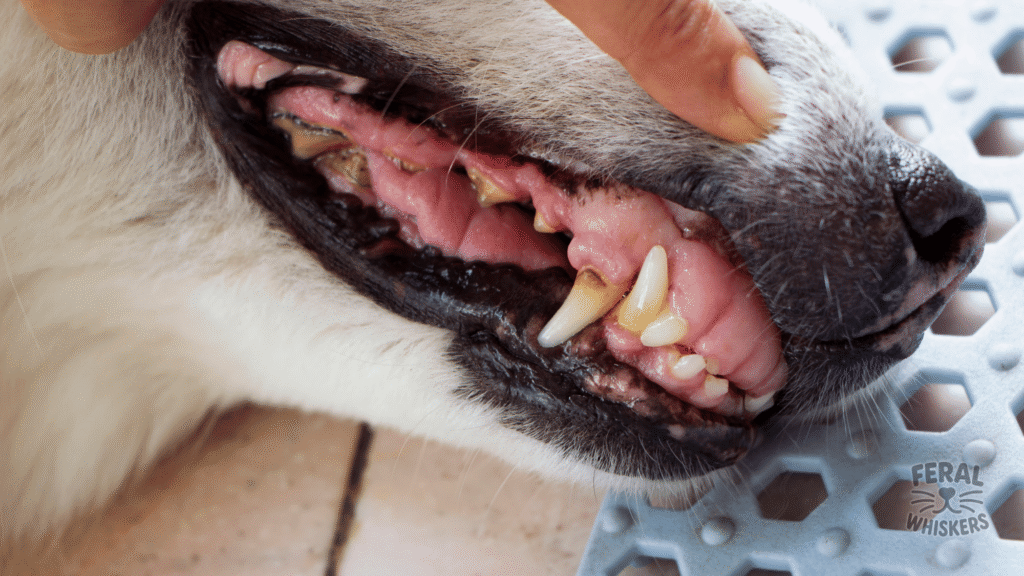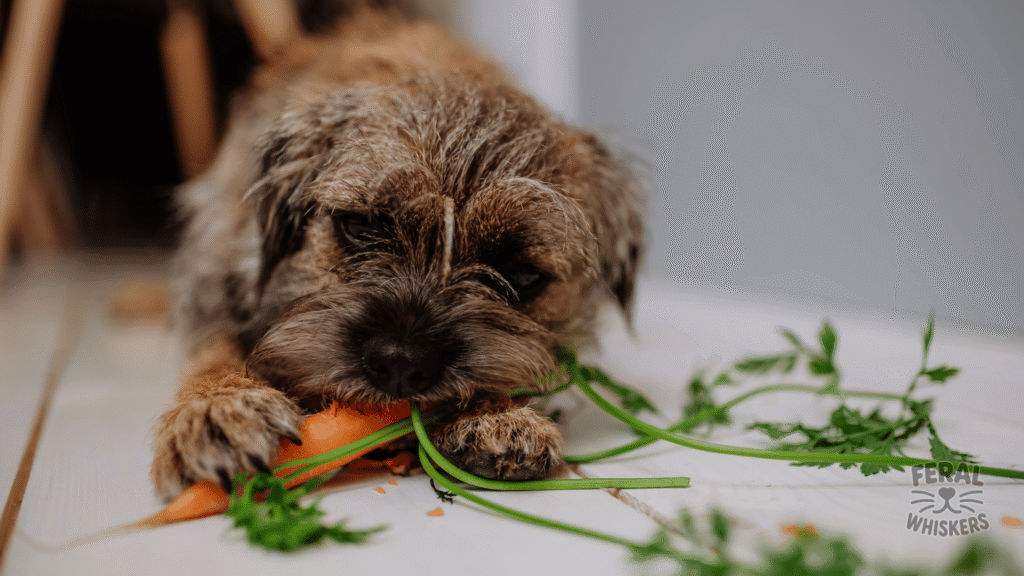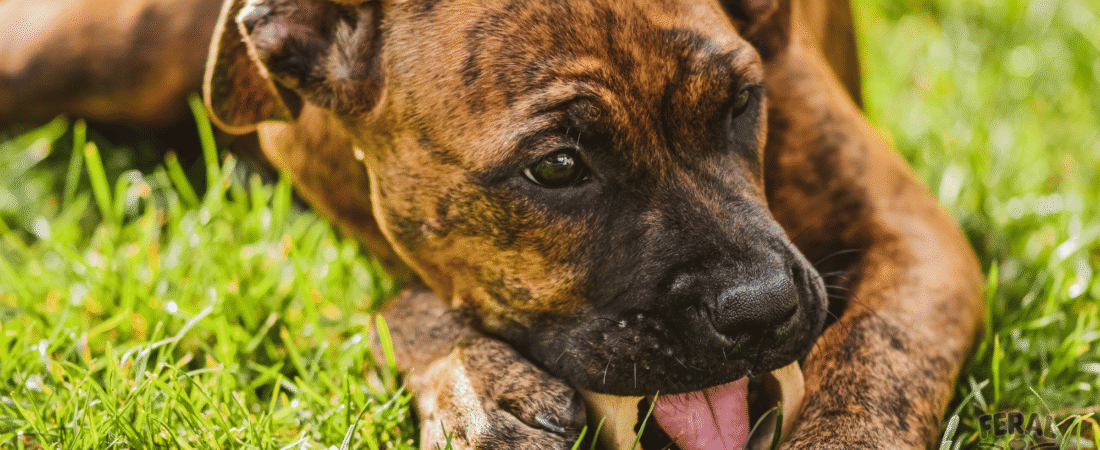📌 Why Dental Health Matters More Than You Think

Doggy breath might seem “normal,” but bad teeth aren’t just cosmetic. Dental disease is the #1 health issue in dogs. By age 3, about 80% of dogs have gum disease! Left untreated, it can lead to pain, tooth loss, infections — even heart, kidney, and liver problems.
Conventional care (like professional cleanings) is important, but many store-bought products use chemicals, artificial flavors, or alcohol-based rinses that may not be ideal long-term.
👉 Holistic oral care takes a safer, natural approach — promoting strong teeth and healthy gums with whole foods, herbal remedies, home practices, and safe chews.
🦠 Signs of Dental Disease in Dogs
- Bad breath (halitosis)
- Yellow or brown buildup (plaque/tartar)
- Red, swollen, or bleeding gums
- Difficulty eating or chewing on one side
- Drooling excessively
- Pawing at the mouth
- Loose, missing, or broken teeth
⚠️ If your dog yelps when eating, refuses food, or has bleeding gums — see a vet.
🌿 Holistic Dental Care Routine

1. Food is Medicine for the Mouth 🍲
- Crunchy fruits and veggies: Carrots, cucumber, celery stalks can gently scrub teeth.
- Raw meaty bones (RMBs): Great for scraping plaque naturally — choose appropriately sized bones (NEVER cooked bones).
- Chewing herbs:
- Parsley: Freshens breath, antibacterial.
- Mint: Natural deodorizer, safe in small amounts.
- Avoid sugars & fillers: Kibble high in carbs feeds oral bacteria.
👉 Tip: Add chopped parsley or mint to meals 2–3x/week for natural breath freshening.
2. Natural Dog Toothpaste Alternatives 🦴
Skip fluoride & xylitol (toxic!). Instead:
- Coconut oil: Antibacterial, anti-inflammatory, can be brushed directly.
- Baking soda (minimal use): Neutralizes acids, whitens teeth.
- Herbal DIY paste: Coconut oil + turmeric + parsley for antimicrobial action.
💡 Brush with a soft-bristled baby toothbrush or finger brush — daily if possible, 3–4x weekly at minimum.
3. Safe Chews & Dental Toys 🐕
Dogs are natural chewers — chewing = cleaning.
- Dehydrated chews: Sweet potato chews, bully sticks, tendons.
- Rawhide alternatives: Safer plant-based chews.
- Dental toys: Rubber, rope, or nylon chews massage gums.
- Raw meaty neck bones (chicken/turkey/duck): Great natural toothbrushes.
⚠️ Always supervise: aggressive chewers may crack teeth if given inappropriate items (like weight-bearing cow bones).
4. Herbal Rinses & Sprays 🌱
- Green tea rinse (cooled): Contains catechins that fight plaque bacteria.
- Aloe vera juice: Soothes inflamed gums.
- Chamomile tea rinse: Calming, antibacterial.
- Apple cider vinegar (diluted): Restores oral pH, reduces bacteria.
👉 Apply with a cotton pad on gums or add drops to water (1 tsp ACV in bowl).
5. Supplements for Gum & Oral Health 💊
- Coenzyme Q10 (CoQ10): Supports gum healing, antioxidant.
- Vitamin C (small, buffered doses): Strengthens connective tissue in gums.
- Probiotics: Oral & gut probiotics reduce bad bacteria responsible for plaque.
- Seaweed (Ascophyllum nodosum): A natural kelp powder shown to reduce plaque buildup when sprinkled over food.
6. Holistic Vet Therapies 🩺
If buildup is severe, dental cleanings may be necessary — but pair with holistic follow-up:
- Ozone therapy: Kills oral bacteria, promotes healing.
- Laser therapy: Can treat gum pockets and inflammation.
- Herbal dental gels: Neem, myrrh, or calendula applied by holistic vets.
🐾 Holistic At-Home Dental Routine (Sample Weekly Plan)
- Daily: Brushing with coconut oil or natural toothpaste.
- 2–3x per week: Give raw meaty bone or natural chew.
- Once weekly: Herbal rinse (green tea or chamomile).
- Ongoing: Add parsley/mint/seaweed supplement to food.
Consistency prevents plaque rather than letting it become tartar (which requires vet scaling).
🚨 What to Avoid
- Xylitol (toxic): Found in some store pastes & gums.
- Fluoride: Safe for humans, not dogs — can cause GI upset/toxicity.
- Cooked bones: Splinter hazard.
- Synthetic sprays: Many contain alcohol or harsh chemicals.
❓ FAQs
Q1: Do I really need to brush my dog’s teeth?
Yes! Brushing is still the #1 way to prevent dental disease — but add chews, rinses, and herbs for backup.
Q2: Is raw feeding better for teeth?
Yes — raw meaty bones mechanically clean teeth far better than kibble. However, proper size/type is crucial.
Q3: What age should I start?
As soon as puppies get their adult teeth (~6 months). Early habits = lifelong acceptance of brushing.
Q4: My dog hates brushing. What can I do?
Start small — rub coconut oil on your finger, reward with treats, then gradually introduce brushing tools.
💡 Final Thoughts
Dental disease silently erodes a dog’s health — but it’s 100% preventable with the right tools. By combining diet, safe chews, herbal rinses, and natural supplements, you can keep your dog’s mouth clean without harsh chemicals. Add in brushing, and your dog will enjoy fresher breath, healthier gums, and a longer, happier life.
✅ Key takeaway: Prevention is easier, cheaper, and safer than treating end-stage dental disease. Start natural care early and stay consistent.

